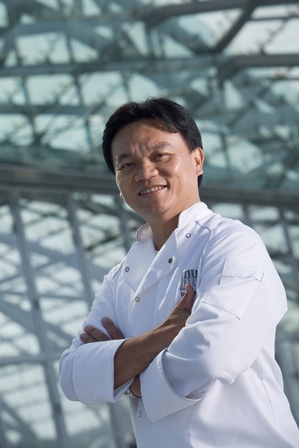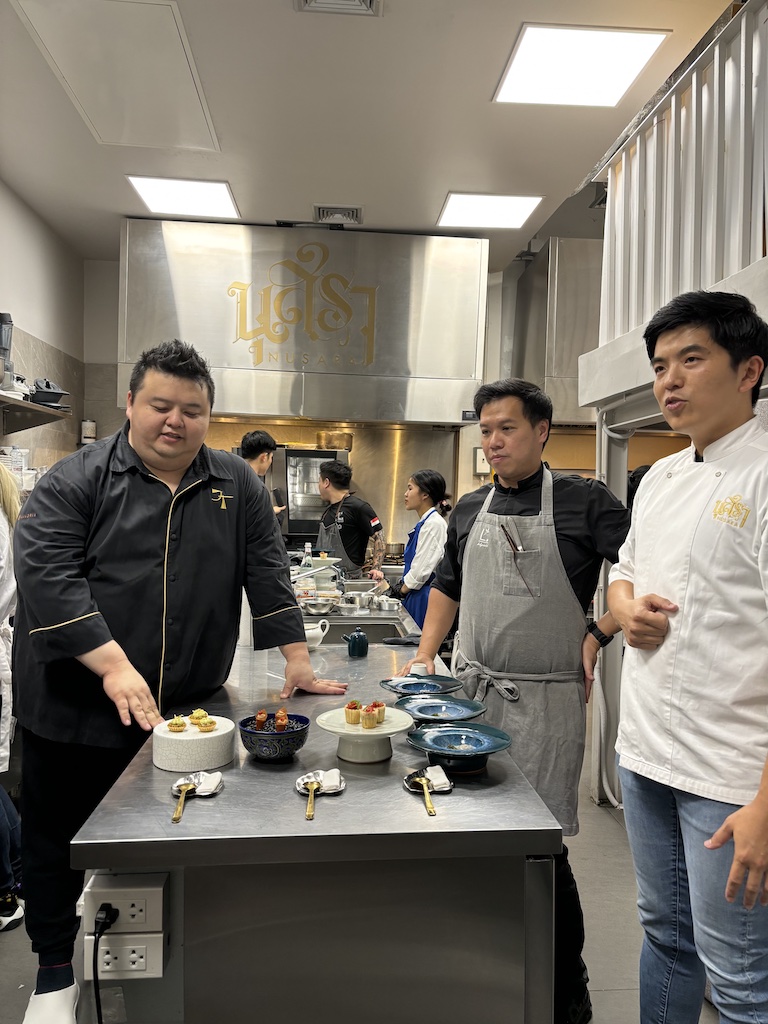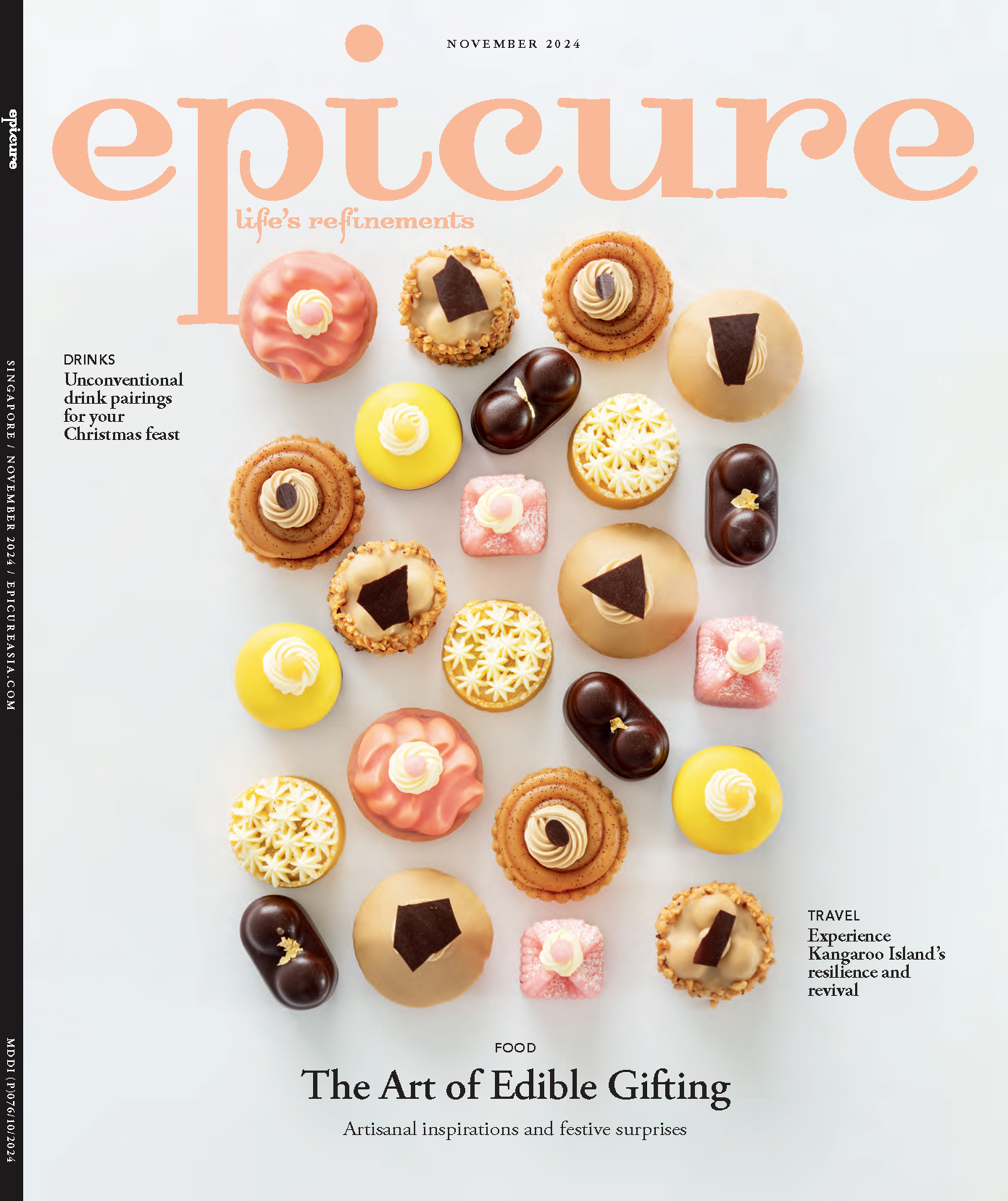Spotlight on: Ian Kittichai
Fate seemed to have other ideas for the man who had no intention of ever being a chef. The Golden Boy of Thai cuisine recounts his humble beginnings as a pushcart peddler in Bangkok, and his fast track up the culinary ladder.
 epicure: As a child, did your mother encourage you to cook?
epicure: As a child, did your mother encourage you to cook?
Ian Kittichai: I am the only boy of eight children and we all had to learn to cook, clean and master odd jobs like making belts and soy milk to help the family at a very young age. My father immigrated to Thailand from China so he would prepare more Chinese dishes while my mother cooked Thai food. Every morning, I would wake up at 3am to accompany her to the wet market to select the best produce for the neighbourhood grocery she ran. And when I came home from school, I’d push a cart through the neighbourhood to sell her homemade curries, shouting: “Khao geang ron ron ma leaw jaar (hot curry coming)!”
London marked the beginning of your culinary career. What prompted your move there?
My best friend, who was a year older than me, was already in London studying English and I wanted to go too. I started working at the Waldorf Hotel THF as a dishwasher at 16 so my mother wouldn’t have to send me money. I didn’t want her to know I had taken on a job as such so I exaggerated and told her that I was in charge of a very large important machine in the hotel. In reality, that machine was the dishwasher! I eventually graduated to pouring coffee and tea at breakfast and bussing tables in the dining room. One day, a line cook didn’t show up and I pitched in to help. I was soon asked if wanted to attend culinary school, fully sponsored. A big part of why I said yes was so that my mother didn’t have to pay for me to further my studies.
You were sent on overseas culinary exchanges at Georges V, French Laundry and El Bulli. Which of these stints proved to be the most difficult? Why?
As Michelin-starred establishments, all of these restaurants were very challenging. At times, it felt like you had to be a perfectionist to earn a place in the kitchen. I worked as a guest chef with Thomas Keller and Ferran Adria for a short period. They each had their own techniques and styles of cooking but it led me to believe in using the freshest and best ingredients.
In 1998, you became the first Thai national to be an executive chef of a five-star hotel. Which hotel was that?
It was The Regent Hotel in Bangkok which later became the Four Seasons. It was tough because in many five-star hotels, the Thai clientele perceives a certain prestige when westerners assume the roles of general manager and executive chef. This is still very prevalent in the industry especially in international hotel brands. Smaller, regional establishments have started lobbying to change this but in Bangkok today, I’m still hard pressed to think of any five-star hotels with locals assuming the two titles. The education system and demand in the culinary arts is only starting to develop now. Give it another 10 years and hopefully we will see the number of Thai chefs in bigger international roles on the rise.
Under your helm, Kittichai Restaurant in NYC snagged numerous awards. What kind of Thai food did you serve and did it have a lot of western influences?
Like every chef who has to think about the profile of their diners, I had to be conscious of certain things when conceptualising my menus. Pork, for example, is not very popular in New York City but it’s a hot favourite in Spain. I also take care to preserve core aspects of Thai cuisine even though I have an international background, sometimes going beyond traditional wok-style cooking to put my personal interpretation on certain dishes.
Why didn’t you stay on at Kittichai Restaurant?
The investor group I was working with at the time did not want to go down this path and I had plans to start restaurants with different concepts. I was eventually led to create Cuisine Concept when hotels and restaurants came to me for advice or request I join them on a project basis. I couldn’t be in 10 places at once so I formed a team of chefs to cater to my growing clients.
What were the toughest lessons you have learnt from your consulting business?
That I have to be responsible for everything, not just the food! My wife is my business partner and she deals with the financial, legal, and marketing aspects of the business, and we have a team of staff who work with and support us. But at the end of the day, I have to know every detail involved and make decisions that I never had to even think about when I was a chef!
Was there a particular consulting project that was difficult to work with?
We were brought in to overhaul the menus and entire back of the house operations at a very secluded five-star resort. Not only was the location difficult to access, most of the staff, having been there for years, were very set in their ways. We had to earn their trust before we could even attempt to implement anything new.
As a consulting chef for Restaurant Murmuri, what do the Spanish expect of Thai food?
I was the consulting chef at Murmuri from 2008 to early 2010. The Spanish are just starting to become more familiar with Asian cuisine in the past five or six years. In Murmuri I had to include dishes that were not so spicy as the typical Spanish palate is not used to a high level of heat.
Which do you prefer? Being a chef in a restaurant or a consultant chef?
I prefer to be my own boss and enjoy having my own company and restaurants. Currently, under my belt, I have my consulting firm, Cuisine Concept Co., Ltd., Hyde & Seek Gastro Bar in Bangkok, Koh by Ian Kittichai in Mumbai, Sucre in Bangkok, and Spot Dessert Bar in New York. I consult for Ember Room in New York and the Intercontinental Hotel in Abu Dhabi.
Tell us more about your new restaurants coming up in New York City and Bangkok.
I am opening two restaurants in Bangkok over the next few months: a Thai restaurant and a ‘nose-to-tail’ dining restaurant. I have a few restaurants in NYC in development that are focused on southeast Asian cuisine and my NYC partners and I are working on expanding our Spot Dessert Bar concept.
Patara Fine Thai Cuisine will showcase chef Ian Kittichai’s signature dishes (a la carte and set lunch/dinner menus) from 21 to 27 November. Degustation dinner menus and cooking class workshops (followed by a set luncheon) will be available on 22 and 23 November. For reservations, please call 6737 0818. #03-14 Tanglin Mall, 163 Tanglin Road.
SHARE

















 SUBSCRIBE
SUBSCRIBE